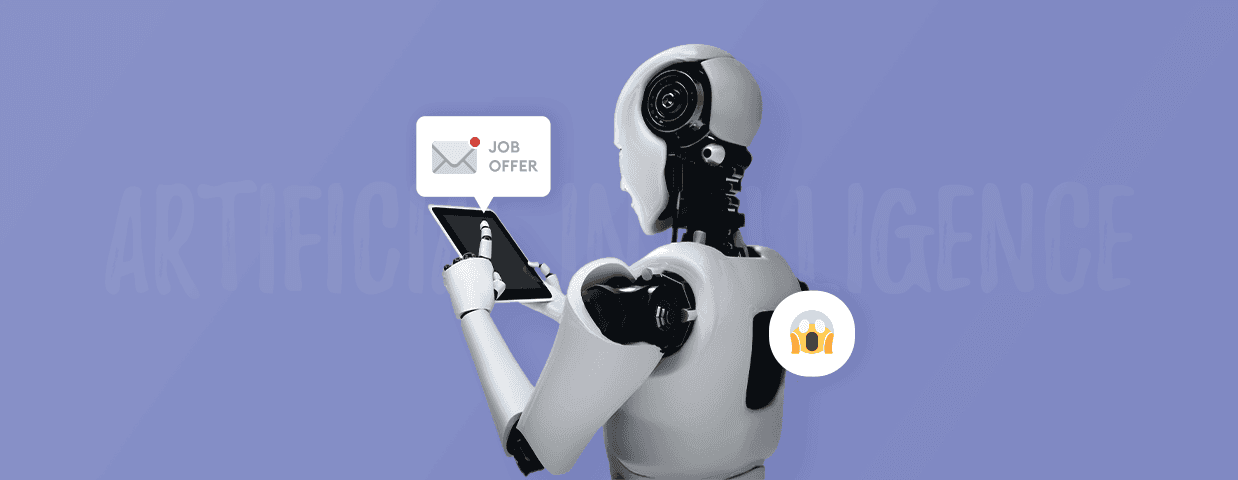Recently, Boston Dynamics released a video of dancing robots. Some people could not believe what they were seeing. It looked more like a Pixar animation than real footage.
This is simultaneously the cutest and most horrifying thing I’ve ever seen—some said.
Should we be afraid of increasingly more advanced AI and robots? Is AI going to take over the world? And more importantly, will it take your job? Or maybe even steal your boyfriend?
We decided to do our own research and surveyed over 1,200 people.
The three main topics we focused on were:
- What form should AI take to inspire our trust?
- What responsibilities are we willing to delegate to artificial intelligence?
- Which professions will be automated by machines and AI software?
You can also check out the results of our previous AI research study on computer vision and AI ethics:
Now—
Fasten your seat belt and let us go over the key findings from our AI survey.
Learn how to use AI in customer service
Top 9 shocking AI stats
Our survey revealed that more and more people are open to the idea of incorporating AI into their daily lives. They do not mind AI taking over everyday tasks or being involved in decision-making processes. On the other hand, AI adoption is fraught with doubts and concerns about AI risks. Here are some of the most interesting trends that have caught our eye.
Nearly 69% of college graduates believe AI could take their job or make it irrelevant in a few years
- People with graduate degrees are the ones most afraid of losing their jobs due to artificial intelligence development. About 68.5% of them fear being replaced by AI, compared to just 55% of other respondents.
Cashiers, drivers, and translators are among the jobs most likely to be replaced by AI according to our respondents
- Cashiers (63% of respondents), drivers (51%), and translators (42%) were named as the professions most likely to be taken over by AI technology. About 25% of respondents also believe customer service representatives and warehouse workers are next in line.
More than 45% of people have a positive attitude towards AI taking control of the economy
- Some claim that AI could prevent corruption and improve the economy. About 45% of respondents want artificial intelligence to adjust fiscal policy and the budget of their country. Still, opinions are highly polarized. Nearly 29% think it’s a terrible idea.
More than 60% of respondents would use a self-driving AI taxi during heavy traffic
- We put a lot of faith in artificial intelligence when it comes to transportation and logistics. More than a half of respondents would not mind taking a self-driving taxi (60%) or having AI manage air traffic (57%).
People are 7 times more worried about the negative impact of AI on the job market than fair treatment of robots
- According to 32% of our survey respondents, robot rights—similar to human rights or animal rights—is a topic we shouldn’t worry about. They believe it is one of the least important issues related to the development of artificial intelligence.
Almost 78% of respondents are convinced that AI will be used to spread misinformation
- Apart from the fear of AI taking away jobs (42% of respondents) or being used by criminals (51%), our survey respondents are concerned about the misuse of AI technology to spread misinformation. Some 78% strongly believe this will be the main AI threat. By comparison, only 3% believe that AI will take revenge on humanity.
Men are twice as likely as women to put their trust in artificial intelligence
- Men place significantly more trust in AI technology than women. They are about twice as likely to have an AI robot operate on them or teach their children. They are also less concerned about potential threats posed by the technology.
Male respondents are 20% more willing to interact with robots and AI
- Existing robot and AI representations from fiction and real life are more appealing to men than women. We used a range of examples and asked respondents if they were willing to interact with the selected robots. On average, 65% of male respondents answered yes, but only 45% of women did so.
Nearly 42% of people would have sex with a humanoid robot
- About 42% of our survey respondents would have sexual intercourse with a robot. Yet, only 39% believe they could have a romantic relationship with an AI. There is also a large discrepancy between men and women. Men are more open to both the idea of sleeping with a robot (48%) and falling in love with an AI (43% of male respondents).
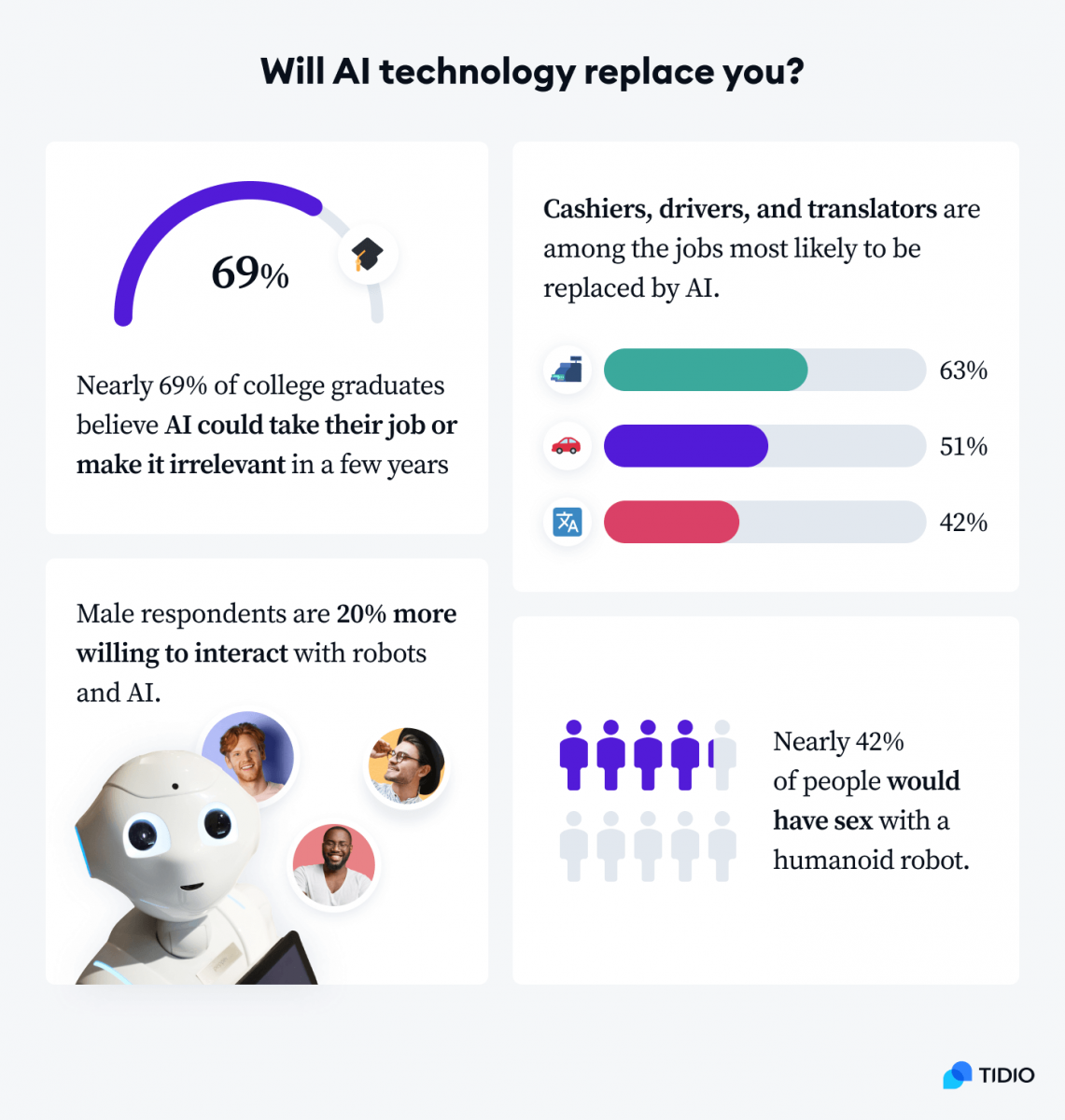
Artificial intelligence taking jobs
According to a widely-commented study on the future of employment, now known as the Oxford Study, about 47% of total US employment is at risk due to rapid computerization.
“Will my job be replaced by a robot?”
This question is becoming more and more valid for most professions.
It is a racial problem too.
As Alana Semuels from Time notices, many people of color and low-wage workers lost their jobs due to the COVID-19 pandemic. She points out that they were primarily, “cashiers, food-service employees, and customer service representatives, which are among the 15 jobs most threatened by automation.” Now, they have problems with getting employed again.
Incidentally, the very same jobs top our list of the professions most likely to be taken over by AI.
Some 65% of our respondents suspect they could lose their jobs to AI in the next few years. And nearly 79% believe that rapid automation is an important issue that we should be particularly concerned about.
There certainly will be job disruption. Because what’s going to happen is robots will be able to do everything better than us.

We asked which professions are most likely to be automated. As a company that develops artificial intelligence chatbots for the ecommerce sector, we are also aware of our contribution to the changes in the job market. Customer service representatives are one of the top positions for professions that may soon become obsolete.
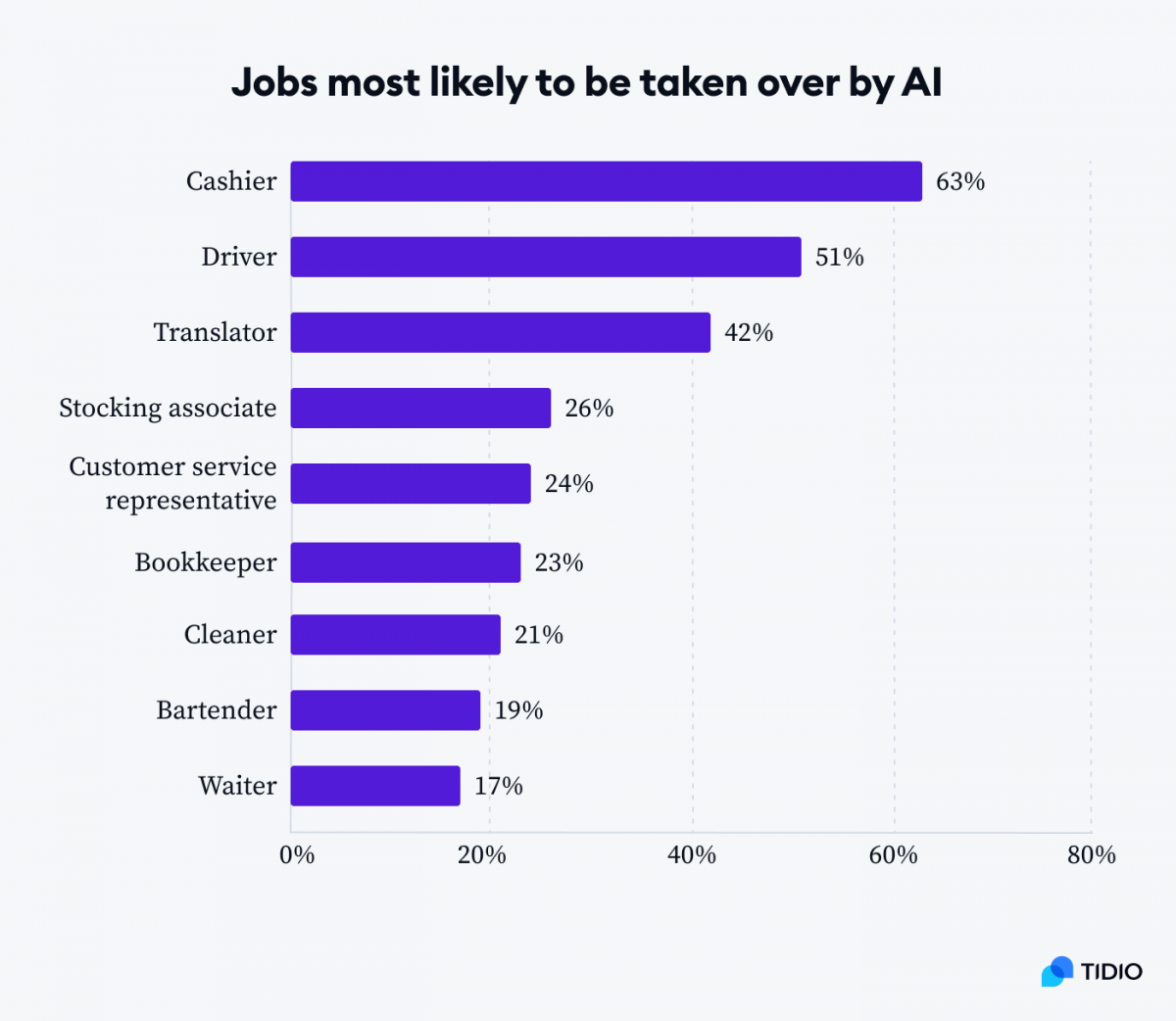
Cashiers, drivers, and translators are popular jobs that are already becoming gradually automated. Self-service checkouts, autonomous trucks, and real-time translation software are part of our reality. It shouldn’t be surprising that the majority of respondents—63% and 51% predict that cashiers and drivers are the jobs most likely to be replaced by technology.
Real-world AI solutions
Common use cases for AI include customer service chatbots. They use machine learning and natural language processing (NLP) to identify message intent. Chatbots can instantly analyze messages and provide quick answers to common questions. Companies use them to save money and improve the customer experience.
Police officers, doctors, lawyers have been voted professions that will survive the AI revolution. Professions typically associated with creativity appear to be even less vulnerable to the disruptive effects of AI technology on the job market. Artists and musicians were selected by almost 39 and 36% of respondents respectively as the jobs least likely to be taken over by artificial intelligence.
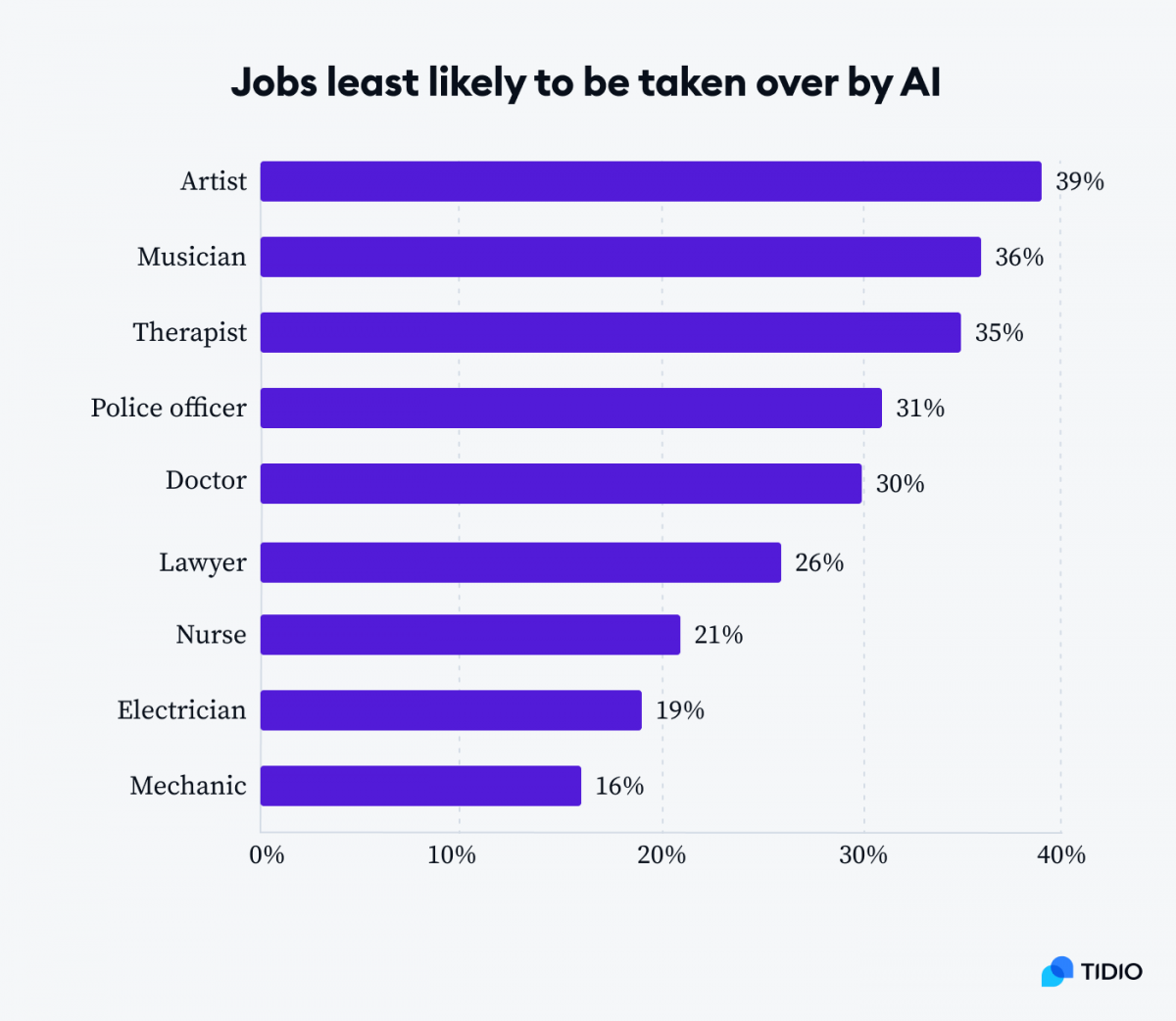
While artificial intelligence is playing an increasingly important role in law or healthcare, AI and robots tend to play intermediate roles between experts and clients or patients.
Grace, a robotic “nurse” created by Hanson Robotics, is still more of a receptionist for hospitals rather than a real nurse. And the majority of patients would feel uncomfortable around her anyways, which brings us to the next part of our study.
Creepy robots and the uncanny valley
Machine learning algorithms that perform complex operations are very abstract. But that’s exactly how the modern world is using artificial intelligence today. We use machine learning and neural networks to automate tasks based on massive amounts of data.
If we want to give AI a personality and a material form, the situation gets a bit more complicated. Humans like other humans, but have an instinctive fear of human-like machines. In the most literal sense, our brains see robots as living human beings with something very wrong going on about them.
This common effect is known as the uncanny valley. Robots that are given human characteristics are more relatable and pleasant to interact with. But only up to a point. After reaching the uncanny valley threshold, their appeal declines. We stop perceiving them as human-like robots and see them as defective humans instead.
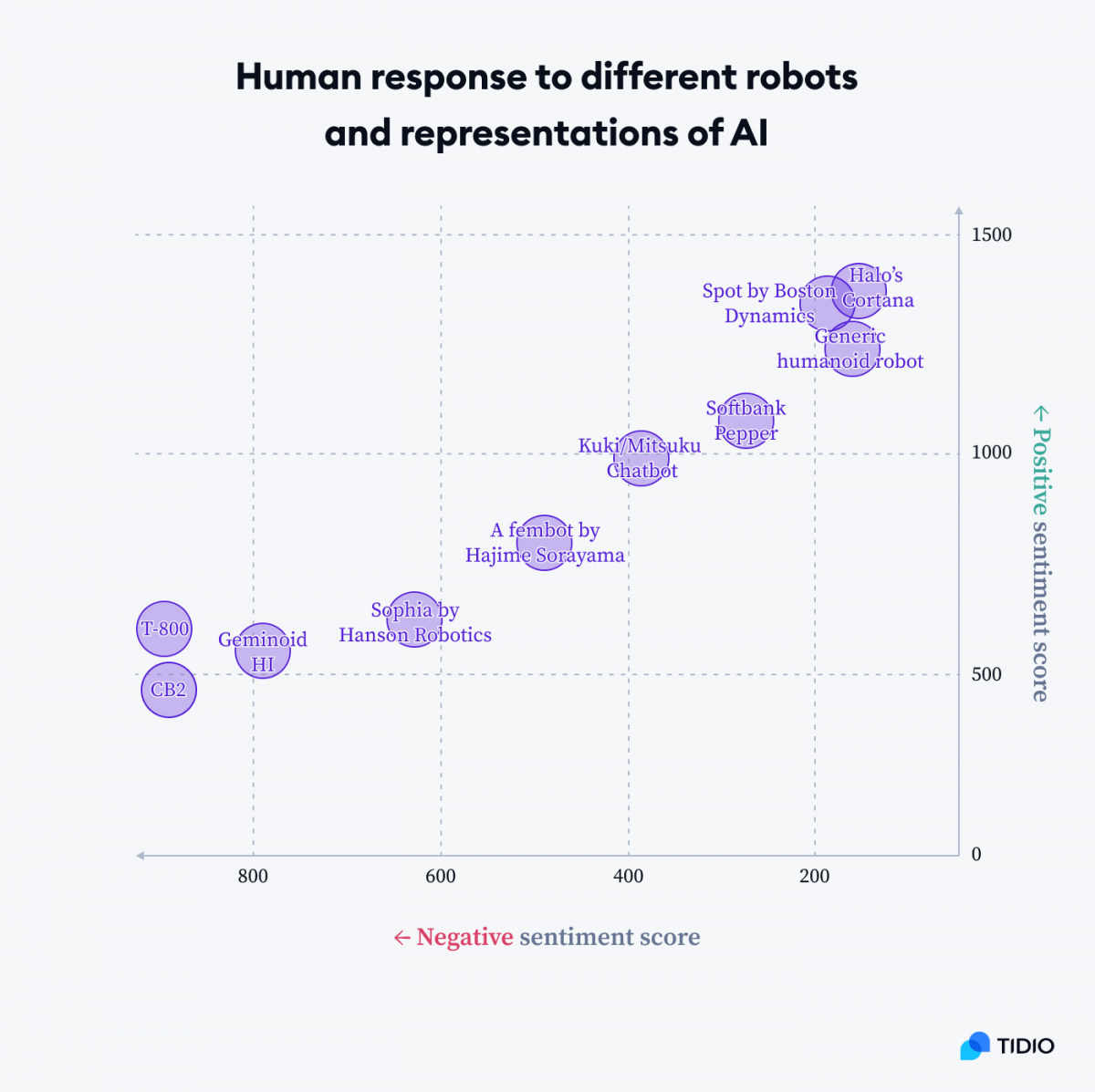
The most liked designs are the ghost-like holograph of Cortana and Spot, the robotic dog. Adding more realistic human features makes the representations of AI less appealing. Interestingly, female respondents are less willing to interact with any type of robots in general.
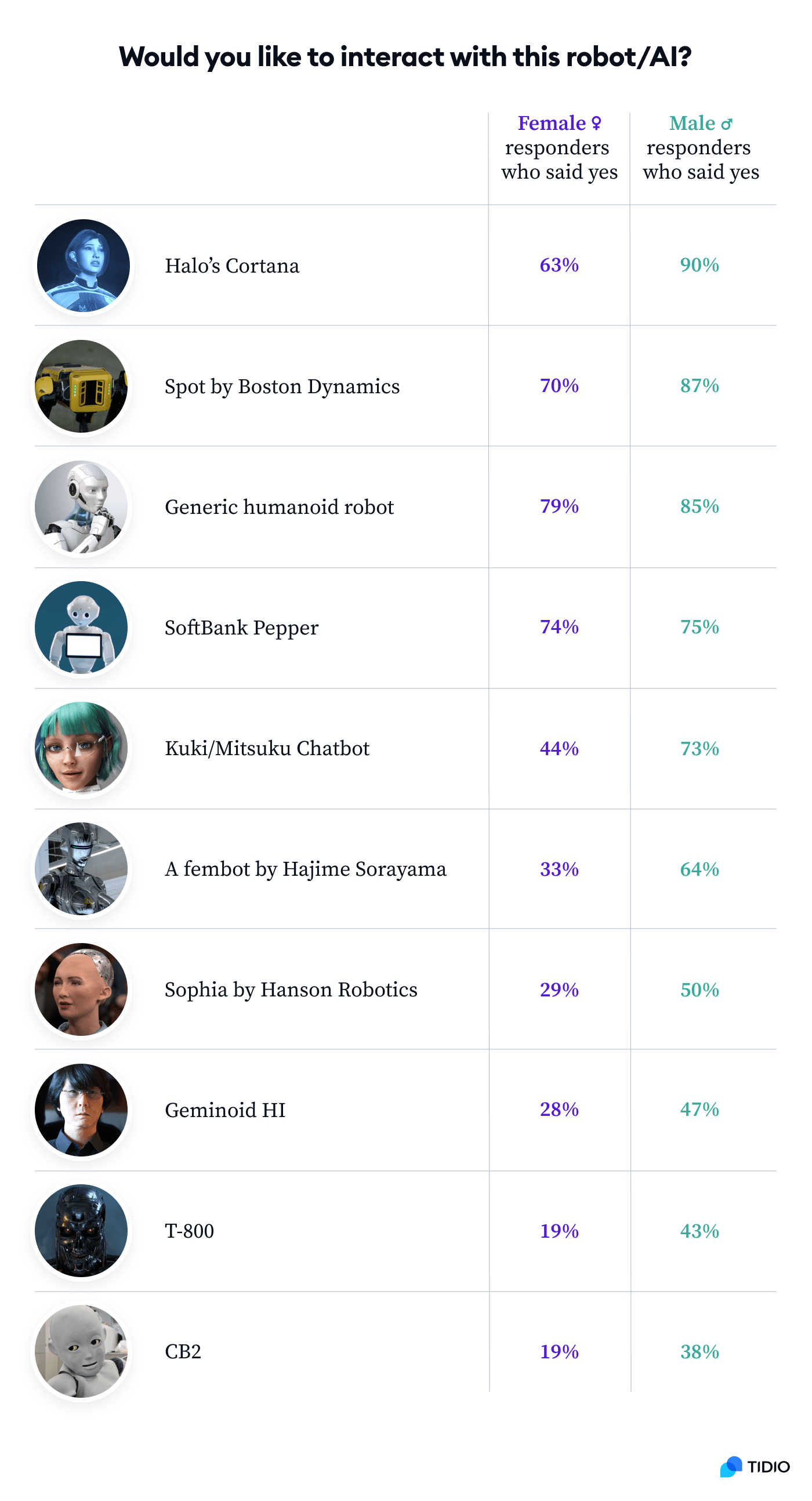
A generic robot with masculine features is more appealing to male respondents than to female respondents. A toy-like robot from SoftBank, while described as “cartoonish” and “condescending,” was still considered more attractive than an overtly sexualized sculpture by Sorayama.
We asked respondents to justify their choices. Here are the most commonly used words to describe robots.
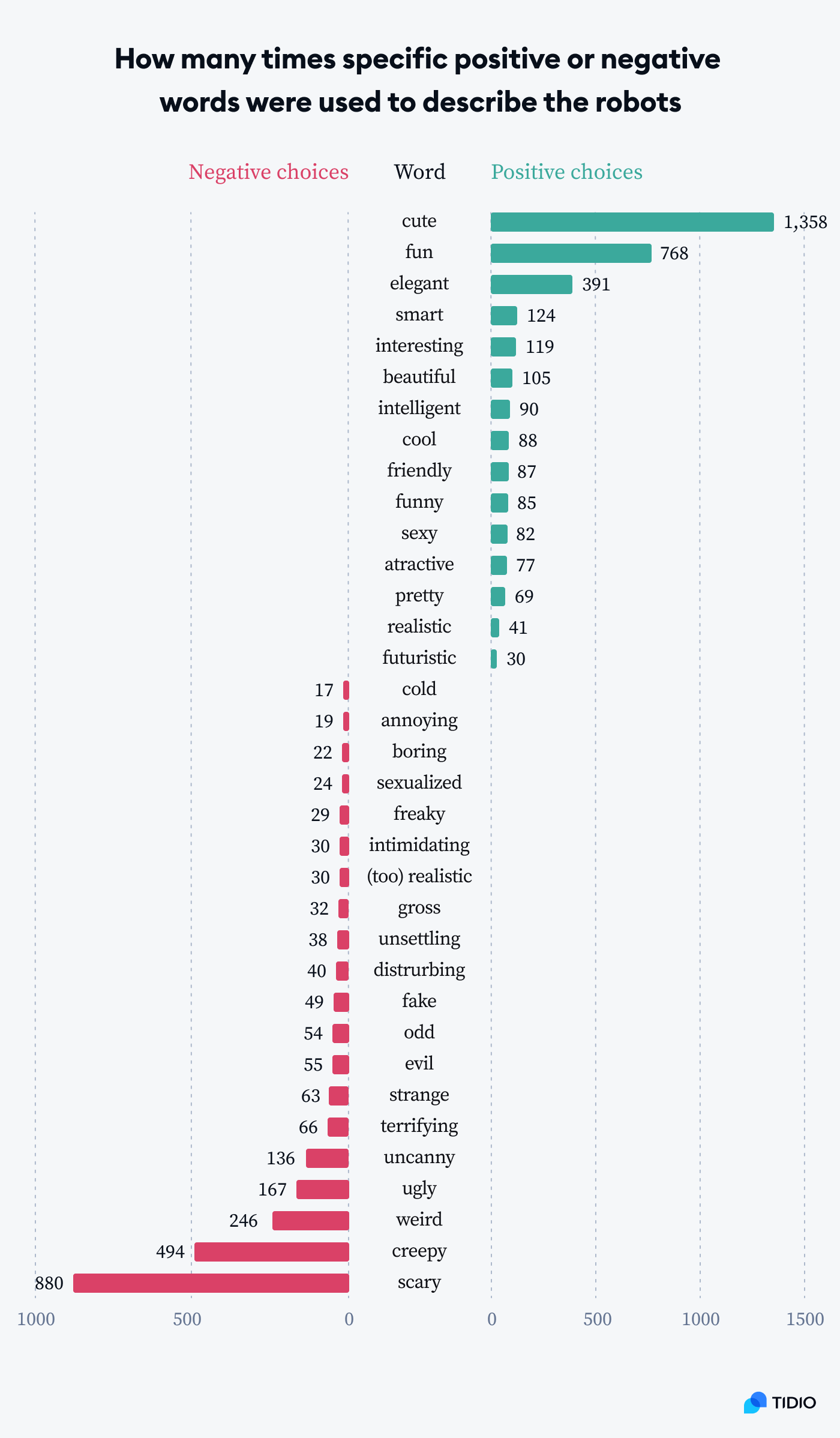
Obviously, the design of AI avatars and robots is strongly linked with our social reality. Robot designers use anthropomorphic features to suggest qualities like strength, helpfulness, or attractiveness. These correlate to common gender stereotypes.
Are virtual assistants and conversation companions female because of the social belief that women are better in these roles? Meanwhile, physical robots like Hermes the rescue robot from MIT, and Atlas, the robot that can Parkour, from Boston Dynamics, look distinctly male in their shape and form. Is it because they are stronger with a more male looking shape?

Would you let a robot perform an unassisted surgery on you?
People may still be suspicious of interacting with intelligent machines. However, they expect them to perform selected actions in the future. Convenience turns out to be the deciding factor.
Here are our findings on AI uses that the general public feels good about:
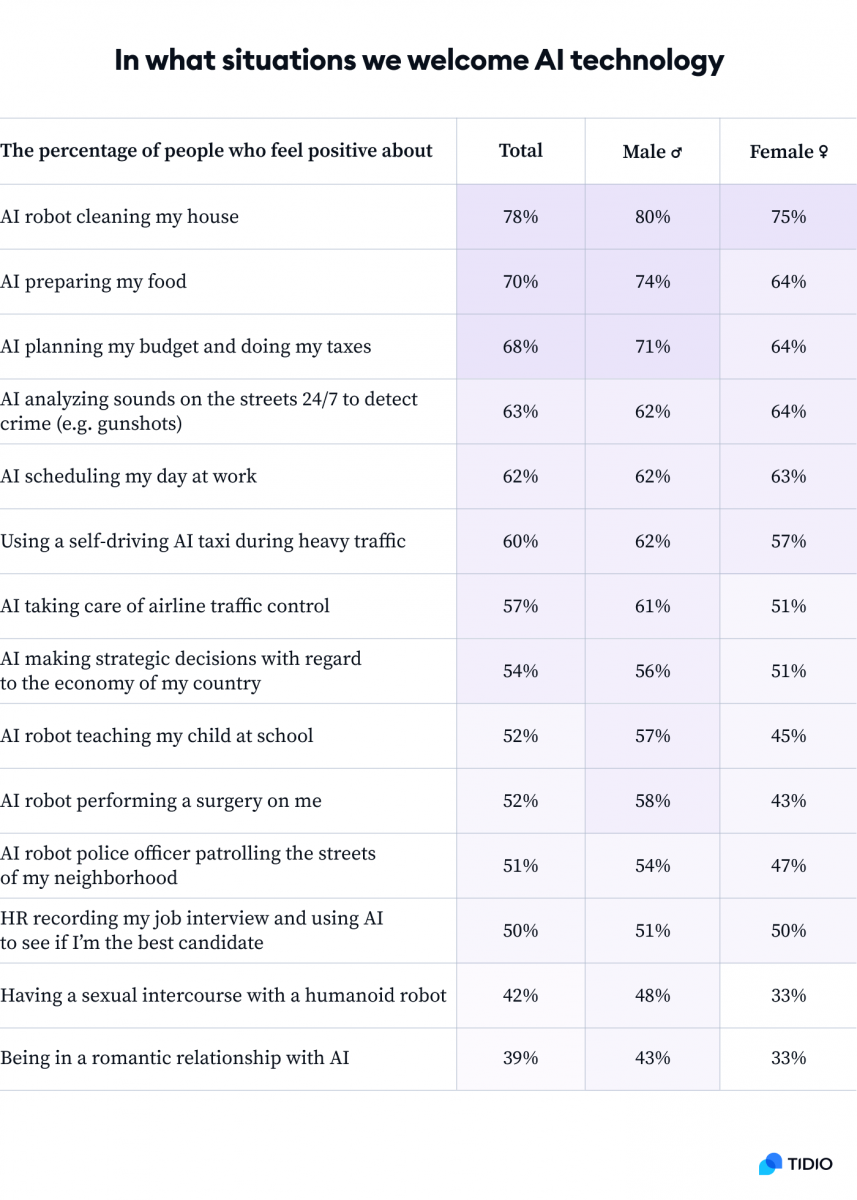
We don’t mind AI doing our daily chores or helping us take care of our health and safety. However, there are some areas where the very idea of replacing humans with robots seems challenging.
Stories of people falling in love with mechanical humanoids have been around for centuries. Olympia from the XIX-century opera The Tales of Hoffmann or Maschinenmensch in Fritz Lang’s Metropolis are great early examples of what we’d call fembots. While sexbots and girl chatbots are growing in popularity, they are still considered a form of fetishism and not widely accepted.
Is artificial intelligence dangerous?
Comments such as the one below are typical of all sorts of technology news regarding AI development.

However, they are all rather humorous in nature. Being afraid of intelligent machines is a recurring joke—a pop culture reference rather than an actual concern.
Some 57% of respondents are convinced that we do not need to worry about AI taking its revenge on humanity. It is seen as unlikely that AI will take control of humanity or declare war.
The real dangers of AI are associated with the misuse of technology to commit crimes or influence the labor market.
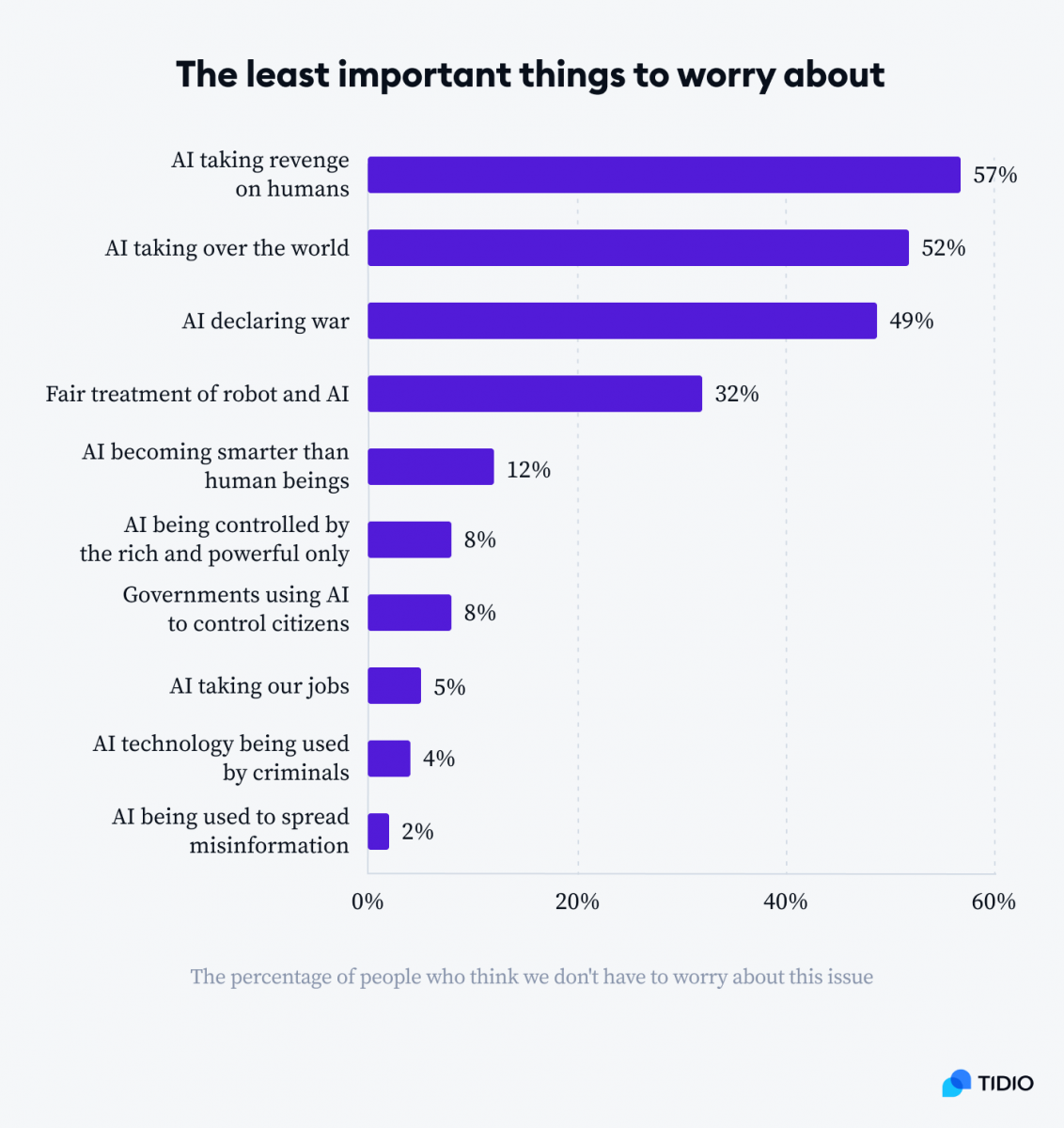
About 68% believe we should worry that AI is controlled only by the rich.
To some extent, the real threats posed by artificial intelligence are also related to the fact that it’s being used as a tool of power.
Nearly 95% of respondents believe AI will help large companies and corporations automate their business processes. But only 70% think that AI will make the lives of ordinary people more convenient.
Our editorial team wanted to find out if AI is capable of making our work more convenient.
Here’s what an AI journalist wrote to sum up our study:
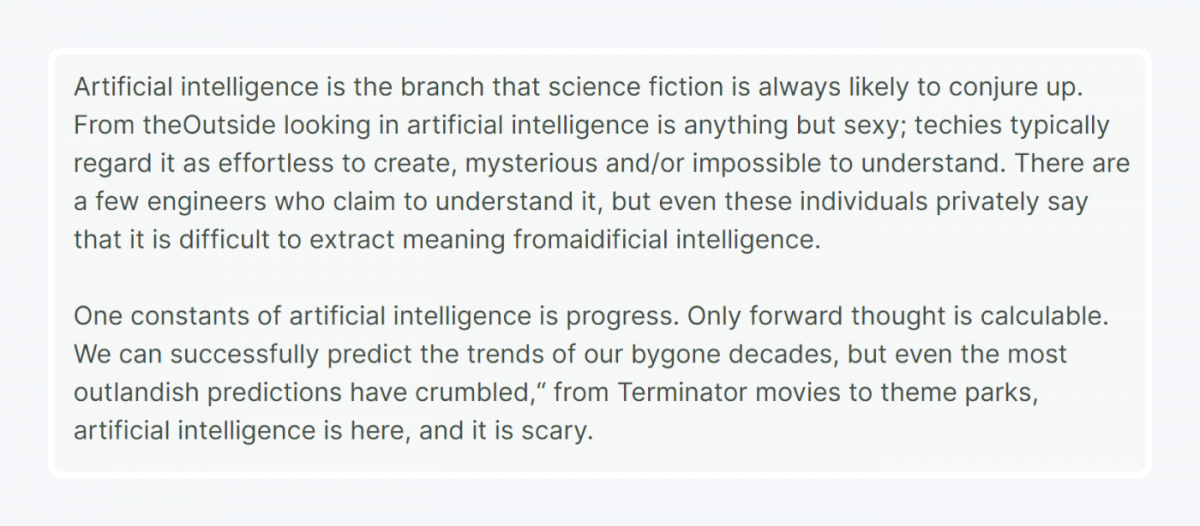
Apparently, it is not taking our jobs anytime soon.
Conclusion
We live in a time of major technological changes.
The fear of artificial intelligence is perfectly legitimate. The acceptance of said technology by different demographic groups is also very thought-provoking. AI fears are most pronounced among the well-educated and women. Technology may once again prove to be a factor that deepens social divisions.
For now, the presentation of the new robot created by Tesla and Elon Musk was only a publicity stunt. It was a man in a costume. Almost no one fears revenge-seeking, Terminator-style AI robots invading their homes.
But—
For a substantial part of society, the AI revolution could mean changing jobs or their lifestyles. The expected disruptions to the job market, education, or transportation should be our major concerns. Before things get out of hand.
Sources:
- The Future of Employment: How Susceptible Are Jobs to Computerization?
- Meet Grace, the Ultra-Lifelike Nurse Robot
- This Is Why AI Has a Gender Problem
- 34% Of Employees Expect Their Jobs To Be Automated In 3 Years
- Would You Let a Robot Lawyer Defend You?
- Boston Dynamics: Do You Love Me? [Dance Routine]
- Millions of Americans Have Lost Jobs in the Pandemic—And Robots and AI Are Replacing Them Faster Than Ever
- Elon Musk Just Added a Robot to His List of Things Always Coming ‘Next Year’
Methodology:
For this study about AI fears and trends, we collected answers from 1,225 respondents. We used Amazon’s Mechanical Turk and Reddit.
Respondents were 55% males and 45% females. The sample’s average age was 39 with a standard deviation of 13. Considering such age and gender makeup, the study’s findings can be extrapolated to the general US population.
Respondents had to answer about 40 questions the majority of which were scale-based or multiple choice. The survey had an attention check question.
Fair Use Statement:
Has our research helped you learn more about emerging artificial intelligence trends? Feel free to share AI statistics from this study. Just remember to mention the source and include a link to this page. Thank you!
